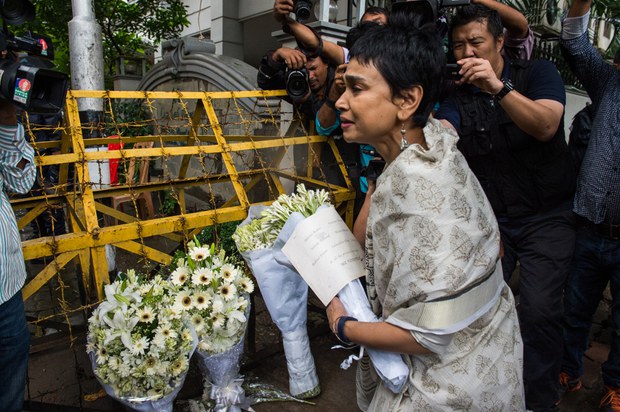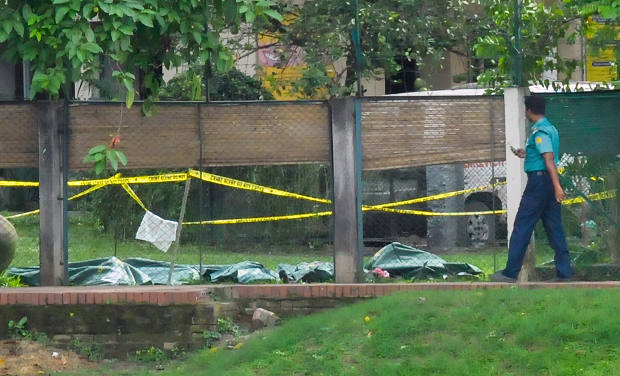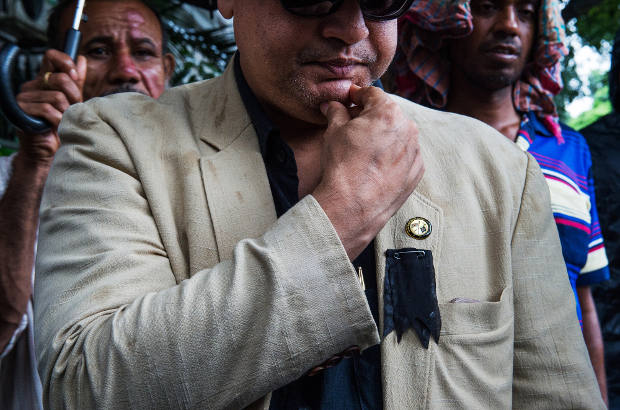Bangladesh Still Denying IS Presence After Terror Attack
2016.07.03
Dhaka
 A woman prepares to leave flowers at a roadblock leading to the site of the attack in Dhaka, July 3, 2016.
A woman prepares to leave flowers at a roadblock leading to the site of the attack in Dhaka, July 3, 2016.
The seven men who slaughtered 20 mostly foreign hostages at a Dhaka café were locals with no links to the Mideast-based Islamic State group, Bangladesh’s home minister said Sunday, as the country began two days of mourning after the IS-claimed terror attack.
"How can IS come to Bangladesh? Do we have borders with Syria and Iraq?” Home Minister Asaduzzaman Khan Kamal told BenarNews.
“So this is not right that IS terrorists carried out the attack. All the attackers are locals; they grew up here,” he added, repeating a message that officials conveyed after previous killings of foreigners and religious minorities in Bangladesh, some of which IS also claimed.
While the siege at the Holey Artisan Bakery in Dhaka’s diplomatic quarter was under way, IS’s propaganda wing, Amaq, posted photos showing what it said were bodies of people hacked to death inside the restaurant.
On Saturday, it released photos of five men it said had carried out the attack, toting guns in front of an IS flag, according to the SITE Intelligence Group, which monitors jihadist activity online.
“The attackers took away the mobile phones of the victims, took snaps of the dead bodies, and sent it to Facebook and other social media. Anyone can send photos to anyone in this age of internet and social media,” Khan said. “Amaq can get the photos from the Facebook or other social media. This does not mean that they are IS members.”
Minister for Tourism and Civil Aviation Rashed Khan Menon told BenarNews that while IS has no organizational structure in Bangladesh, local militants have embraced the concept.
‘They are from rich families’
Six of the seven terrorists were killed and the seventh was captured when security forces stormed the café on Saturday morning and ended the stand-off.
Police Inspector-General A.K.M. Shahidul Hoque said the seven assailants were all members of the banned home-grown radical group Jamaat-ul-Mujahideen Bangladesh (JMB) and that five of them were already wanted by police for terrorist-related activities, according to news reports.
Police on Sunday also identified five of the assailants by their first names, and released photos of their corpses.
"They are all Bangladeshis. They are from rich families, they have good educational background," AP quoted the home minister, Khan, as saying in describing the attackers.
According to a report in the Asia Times, as they negotiated with Bangladeshi security officials, the hostage-takers demanded that authorities release Khaled Saifullah, a leader of the JMB. He was arrested on the eve of the restaurant siege on suspicion of being the mastermind of a non-fatal machete attack on a Hindu professor in Madirapur district on June 15.
Amid the denials from Bangladeshi officials, the U.S. State Department referred to the Dhaka siege when it condemned another IS-claimed attack, a car bombing Sunday in Baghdad, Iraq that reportedly killed 125 people.
“These acts of mass murder are yet another example of Da’esh’s contempt for human life. From Baghdad to Istanbul, Brussels, Dhaka, and Paris, Da'esh terrorists murder the innocent to attract attention and recruits,” the State Department said, using another name for IS.
“They will not succeed. We will continue to unite the world against this evil, remove their safe havens in Syria and Iraq, and uproot their global networks,” it added.

A policeman walks past body bags believed to be those of terrorists killed in the attack on the Holey Artisan Bakery in Dhaka, July 2, 2016. [AFP]
‘They will only kill non-Muslims’
In a televised address late Saturday, Prime Minister Sheikh Hasina announced two days of national mourning, starting Sunday. On Monday, the prime minister was to lead a public memorial service at Army Stadium in Dhaka, local media reported.
The siege that lasted at least 10 hours began on Friday night and ended on Saturday morning when Bangladeshi security forces stormed the café.
The death toll of 28 included two senior police officers and six of the seven alleged assailants. Thirteen people, including a Japanese national, two Sri Lankans, and 10 Bangladeshis were rescued by the security forces.
Since early 2013 dozens of people, including minorities, secular bloggers, intellectuals and gay-rights activists have been killed in attacks by suspected religious extremists across Bangladesh. Those attacks mostly targeted individuals.
After they stormed into the restaurant on Friday evening, the assailants separated foreigners from other hostages and then hacked the foreigners to death, according to Agence France-Presse, which cited an eyewitness account.
"They burst [into] the restaurant firing their weapons and I could hear them shouting ‘Allahu Akbar’ [‘God is great’],” a worker at the restaurant told AFP.
"They asked me whether I was a Muslim. As I said yes, they said they wouldn't harm or kill any Muslims. They will only kill the non-Muslims,” the survivor said.
The dead hostages included nine Italians, seven Japanese, an Indian national, a U.S. citizen and-two Bangladeshis, according to Inter-Service Public Relations, the publicity wing of the Bangladesh Armed Forces.
The Italian foreign ministry identified its nine slain citizens as Adele Puglisi, Marco Tondat, Claudia Maria D’Antona, Nadia Benedetti, Vincenzo D’Allestro, Maria Rivoli, Cristian Rossi, Claudio Cappelli and Simona Monti.
A tenth Italian who was at the restaurant had been listed as missing. On Sunday, AP reported that Italian pastry chef Jabopi Bioni had escaped the attack and immediately fled the country.
"I grabbed two things and my passport, headed to the airport and caught the first flight out," he was quoted as saying from Bangkok, in an interview with an Italian television channel.
AP identified the seven slain hostages from Japan – Bangladesh’s biggest foreign aid donor – as Koyo Ogasawara, Makoto Okamura, Yuko Sakai, Rui Shimodaira, Hiroshi Tanaka, Nobuhiro Kurosaki, and Hideki Hashimoto.
The Indian national was Tarishi Jain, a student at the University of California-Berkeley in the United States, the Indian government confirmed.
Emory University of Atlanta, Georgia, another U.S. college, said in a statement that its students Abinta Kabir and Faraaz Hossain “were among those taken hostage and murdered by terrorists yesterday in the attack in Dhaka, Bangladesh.”
Asia Times identified the 20th victim as Ishrat Akhond, a Bangladeshi national and human resources director with a private firm in Dhaka.

A mourner stands along the road near the site of a terror attack at a café in Dhaka’s diplomatic quarter, July 3, 2016. [AFP]
Shahriar Sharif in Dhaka contributed to this report.







